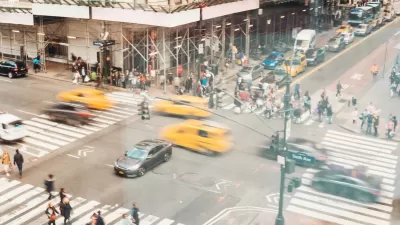A new study published in the American Journal of Epidemiology has linked an increase in the likelihood of being in a traffic fatality to a person's educational level.

Emily Badger and Christopher Ingram of The Washington Post report that despite improvements in safety features on newer vehicles, fatality rates for those 25 and older with less than a high school education continues to rise, contrary to the decrease in fatalities among those with more education.
"The underlying issue here is not that a college degree makes you a better driver. Rather, the least-educated tend to live with a lot of other conditions that can make getting around more dangerous. They own cars that are older and have lower crash-test ratings. Those with less education are also likely to earn less and to have the money for fancy safety features such as side airbags, automatic warnings and rear cameras."
Assumptions that the less educated are less likely to wear seat-belts or are more likely to have alcohol related accidents have proven false, for the most part. While seat-belt usage among the less-educated is less than other socio-economic groups, the report shows that usage has increased faster than other groups over time, narrowing the difference. Similarly, data related to the influence of alcohol in accidents "is also conflicting."
FULL STORY: The hidden inequality of who dies in car crashes

Maui's Vacation Rental Debate Turns Ugly
Verbal attacks, misinformation campaigns and fistfights plague a high-stakes debate to convert thousands of vacation rentals into long-term housing.

Planetizen Federal Action Tracker
A weekly monitor of how Trump’s orders and actions are impacting planners and planning in America.

In Urban Planning, AI Prompting Could be the New Design Thinking
Creativity has long been key to great urban design. What if we see AI as our new creative partner?

King County Supportive Housing Program Offers Hope for Unhoused Residents
The county is taking a ‘Housing First’ approach that prioritizes getting people into housing, then offering wraparound supportive services.

Researchers Use AI to Get Clearer Picture of US Housing
Analysts are using artificial intelligence to supercharge their research by allowing them to comb through data faster. Though these AI tools can be error prone, they save time and housing researchers are optimistic about the future.

Making Shared Micromobility More Inclusive
Cities and shared mobility system operators can do more to include people with disabilities in planning and operations, per a new report.
Urban Design for Planners 1: Software Tools
This six-course series explores essential urban design concepts using open source software and equips planners with the tools they need to participate fully in the urban design process.
Planning for Universal Design
Learn the tools for implementing Universal Design in planning regulations.
planning NEXT
Appalachian Highlands Housing Partners
Mpact (founded as Rail~Volution)
City of Camden Redevelopment Agency
City of Astoria
City of Portland
City of Laramie





























